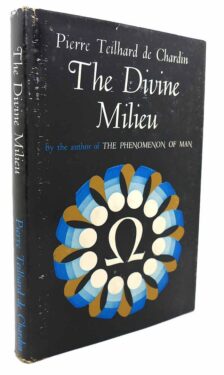Fifth in a series
There is a statement in Father Pierre Teilhard’s spiritual masterpiece “The Divine Milieu: An Essay on the Interior Life” (Harper & Brothers, 1960) that seems to me to be especially important today. Teilhard is writing about the contribution that those who are often described as “unbelievers” might be making to the sanctification of the world. I believe that the Holy Spirit is operative in every person’s life and that it is quite possible that someone who does not believe in the Holy Spirit might be engaged in actions that amount to cooperating with the Spirit’s presence.

Those who do believe in the Holy Spirit’s presence should not be threatened by this or worse, somehow resent the good that is being accomplished by “unbelievers.” That those who are not believers can perform actions that build the Kingdom of God should not be taken to suggest that Christian faith is superfluous, that it just does not matter. Of course it matters, but in our thinking we should not restrict the Holy Spirit’s sanctifying activity to only those identified as believers. God’s love excludes no one. Teilhard must have believed that deeply. Teilhard writes the following:
“Around us the ‘natural’ progress which nourishes the sanctity of each new age is all too often left to the children of the world, that is to say to agnostics or the irreligious. Unconsciously or involuntarily, no doubt, these collaborate in the Kingdom of God and in the fulfillment of the elect: their efforts, transcending or correcting their incomplete or bad intentions, are gathered in by Him ‘whose energy subjects all things to itself.’ But that is no more than a second best, a temporary phase in the organization of human activity. Right from the hands that knead the dough, to those who consecrate it, the great and universal Host should be prepared and handled in a spirit of adoration.
“May the time come when men, having been awakened to a sense that the close bond linking all the movements of this world to the unique work of the Incarnation, shall be unable to give themselves to a single one of their tasks without illuminating it with the clear vision that their work — however elementary it may be — is received and made use of by a Centre of the universe.
“When that comes to pass, there will be little to separate life in the cloister from the life of the world.” (pp. 36-37) Those words of Teilhard are so rich that I may use them tomorrow as part of a prayer. I love the vision that all people, indeed all of reality, can contribute to the work of the Incarnation.
I also love Teilhard’s insistence that all are called to holiness. There was a time that many Catholics thought that holiness was for priests and religious but not for everyone. I think Vatican II has made clear that there is a universal call to holiness. Just as there is no such reality as an unimportant person, there is no person who is not invited into an intimate, loving relationship with God. Pope Francis said early in his pontificate that he believed that God was part of everyone’s life.
That seemingly simple statement, if accepted as true, can influence how we think of others and how we relate to others. The Holy Father’s insight has helped me to think differently about many pastoral problems.
There are several ways that realizing that everyone has a unique gift to give to the building of God’s Kingdom can profit someone. What comes to my mind first is that this realization should help us to battle temptations to pride. Being aware that no good act is possible without the presence of the Holy Spirit can help us to recall that whatever good we do would never be done without the Holy Spirit’s presence. Also we can be reminded that those of us who identify ourselves as believers do not own the Holy Spirit.
Our basic response when we realize that those Teilhard describes as “agnostics” and “irreligious” can contribute to the growth of the Kingdom of God should be awe at the Spirit’s power to influence and sanctify people and gratitude that God’s transforming love is not confined and limited to those who are believers. Teilhard’s vision of redemption not only embraces all persons but even embraces the entire material world. I hope that the next time I celebrate Mass I will remember this. The power that the Spirit shares with us is amazing. I think of the power of a Mass and indeed of every sacrament. None of us can appreciate fully how blessed we are because of God’s love for us, but we should keep trying. We want to make our lives a kind of “Thank You.”
Father Lauder is a philosophy professor at St. John’s University, Jamaica. He presents two 15-minute talks from his lecture series on the Catholic Novel, 10:30 a.m. Monday through Friday on NET-TV.
